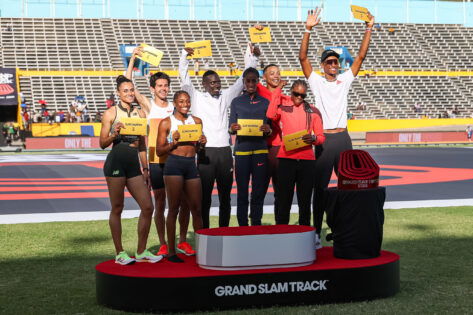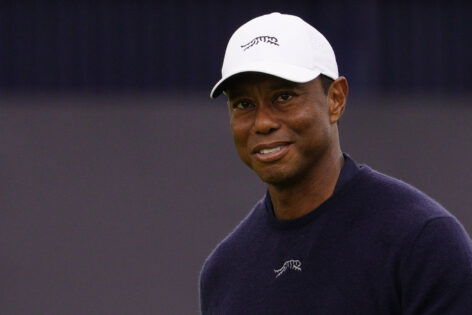In a sport starving for fresh excitement and market expansion, the emergence of Grand Slam Track should’ve been a celebration. But instead, the buzz surrounding the new pro league has quickly devolved into an online brawl, with several voices, particularly from within American track circles, throwing shade over everything from its format to its venue. And this barrage hasn’t sat well with Jamaica’s Olympic medalist Warren Weir, who’s had enough of the negative noise.
Weir, once a fixture on the global stage, is now a leading voice defending the new league. He made it clear that athletes criticizing Grand Slam Track aren’t just hurting the league, but they’re undermining the very foundation of professional track and field. “When you have the Americans are somewhat bashing Grand Slam, it doesn’t look good to the American fan base,” he said, clearly irritated.
“Bro, you’re making money already whether or not—leave other people to come and take some,” he further added. Weir’s frustration cuts deeper than opinion. For him, public slander from prominent athletes damages the league’s credibility in the eyes of fans, investors, and even curious newcomers who might otherwise support the event.
“It doesn’t look good to the shareholders. It doesn’t look good to the fans. It doesn’t look good to somebody who just pops up and goes to watch it,” he warned. His tone wasn’t just defensive but also protective. Protective of the opportunities Grand Slam Track could offer future generations of sprinters and hurdlers who don’t yet have a platform. And, well, he didn’t stop there.
For Weir, the bashing feels short-sighted, a lack of broader vision within the sport. “I totally disagree with every athlete who comes and full-on bash it,” he declared. “Like, why would you bash it, bro?” He isn’t denying there’s room for improvement. But tearing it down publicly, in his eyes, reeks more of ego than valid critique.
The idea that a new league could coexist with the Diamond League, bringing competition and potentially bigger paydays, seems to be lost on some. “I don’t think a lot of athletes have that type of critical thinking,” Weir added, pointing to a mentality gap within elite track circles. Another track and field expert seconded Weir, saying, “Diamond League is in town, they can pay you whatever they want because they’re not going anywhere else.
Surely, the backlash against Grand Slam Track may have started as a critique of format and location, but what it’s sparked is something more telling. A civil war of sorts within the track and field community. And voices like Weir’s are now forcing a much-needed conversation: if athletes won’t protect their own sport’s growth, who will? Meanwhile, listening to fans’ calls, Michael Johnson recently made a bold move that drew significant praise from the fans.
Michael Johnson’s weekend gamble paid off in Philly GST, but at what cost?
It was a bold pivot, one that could’ve gone sideways. Michael Johnson, the legendary sprinter turned commissioner, shrunk his Grand Slam Track meet from a sprawling three-day affair to a two-day sprint in the heart of Philadelphia. The move, meant to streamline the action and sharpen the product, came with risks. But as the roars at Franklin Field showed, it might’ve been the best decision the league has made yet.
“You could tell they were fans,” journalist Theo Kahler noted after the meet, pointing out the goose hat in the stands and the girl who skipped prom just to see Sydney McLaughlin-Levrone. This wasn’t just a crowd; it was a community, dialed in and ready. Dan Beck, too, agreed, “Two days is much more digestible and, for the most part, only added to the excitement.” Gone were the lulls of a drawn-out format.
Instead, fans were treated to a tight, two-hour block of high-octane races with few breaks, all condensed into one thrilling weekend. Still, streamlining the meeting may have come at a price. While the action was electric and the atmosphere proved promising, the new format forced adjustments behind the scenes. Athletes had to recalibrate quickly between events.
With just two days, there was little margin for error or recovery. Yet the trade-off was clear. A packed grandstand, a surge of energy on the home stretch, and proof that track and field, when packaged right, can hook fans without stretching their patience. Johnson’s experiment isn’t perfect yet, but in Philly, it struck a chord.
The post Displeased with Criticism, Track and Field Stars Voice Frustration Over Grand Slam Track Slander appeared first on EssentiallySports.



